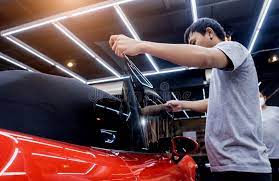
In a world where aesthetics and functionality often blend seamlessly, Heat control window tint emerges as a prime example of how a simple change can have multifaceted benefits. This practice, which might seem like a minor upgrade to your car or home, has evolved into a sophisticated technique with far-reaching implications.
Aesthetic Appeal
Window tinting isn’t just about blocking out sunlight; it’s also about style. With a variety of shades and colors available, tinting allows homeowners and vehicle owners alike to customize their look. Whether it’s the sleek, dark finish of a high-end vehicle or the subtle, reflective touch on a modern building, window tinting provides a polished appearance that enhances curb appeal and personalizes spaces.
Temperature Regulation
One of the most practical benefits of window tinting is its impact on temperature regulation. Tinted windows can reduce the amount of heat that enters a building or vehicle, making environments more comfortable without over-reliance on air conditioning. This is particularly useful in hot climates, where the sun’s rays can turn a car into a sweltering oven or make living spaces uncomfortably warm. By decreasing heat absorption, window tinting helps maintain a consistent, pleasant temperature, which can translate into lower energy bills.
UV Protection
Beyond temperature control, window tinting offers significant protection against ultraviolet (UV) radiation. The sun’s UV rays can be harmful, causing skin damage and accelerating the fading of interior furnishings and upholstery. High-quality window tints can block up to 99% of these rays, protecting both occupants and interiors. This UV barrier is particularly valuable for those with sensitive skin or for vehicles parked outdoors where sun exposure is inevitable.
Enhanced Privacy
Privacy is another compelling reason to consider window tinting. Tinted windows provide a degree of confidentiality without the need for heavy drapes or blinds. In homes, this means you can enjoy natural light while keeping prying eyes at bay. For vehicles, it offers a similar level of discretion, making it harder for onlookers to see inside.
Safety and Security
Window tinting can also contribute to safety and security. In the event of an accident, tinted windows can help hold shattered glass together, reducing the risk of injury from sharp fragments. Additionally, the increased difficulty of peering inside can deter potential theft, as valuables remain less visible to opportunistic burglars.
Legal Considerations
It’s essential to be aware of local regulations regarding window tinting. Laws vary widely by region, and what’s permissible in one area might be illegal in another. Regulations often dictate the level of tinting allowed on different windows of a vehicle or building, so it’s crucial to check and comply with these rules to avoid fines and ensure safety.
Conclusion
Window tinting is far more than a cosmetic enhancement. It merges style with functionality, offering benefits that range from improved comfort and energy efficiency to enhanced privacy and UV protection. As technology advances, the materials and techniques used in window tinting continue to evolve, promising even greater advantages for the future. Whether you’re looking to upgrade your car, improve your home’s energy efficiency, or simply enjoy a bit more privacy, window tinting presents a versatile solution with a host of advantages.




